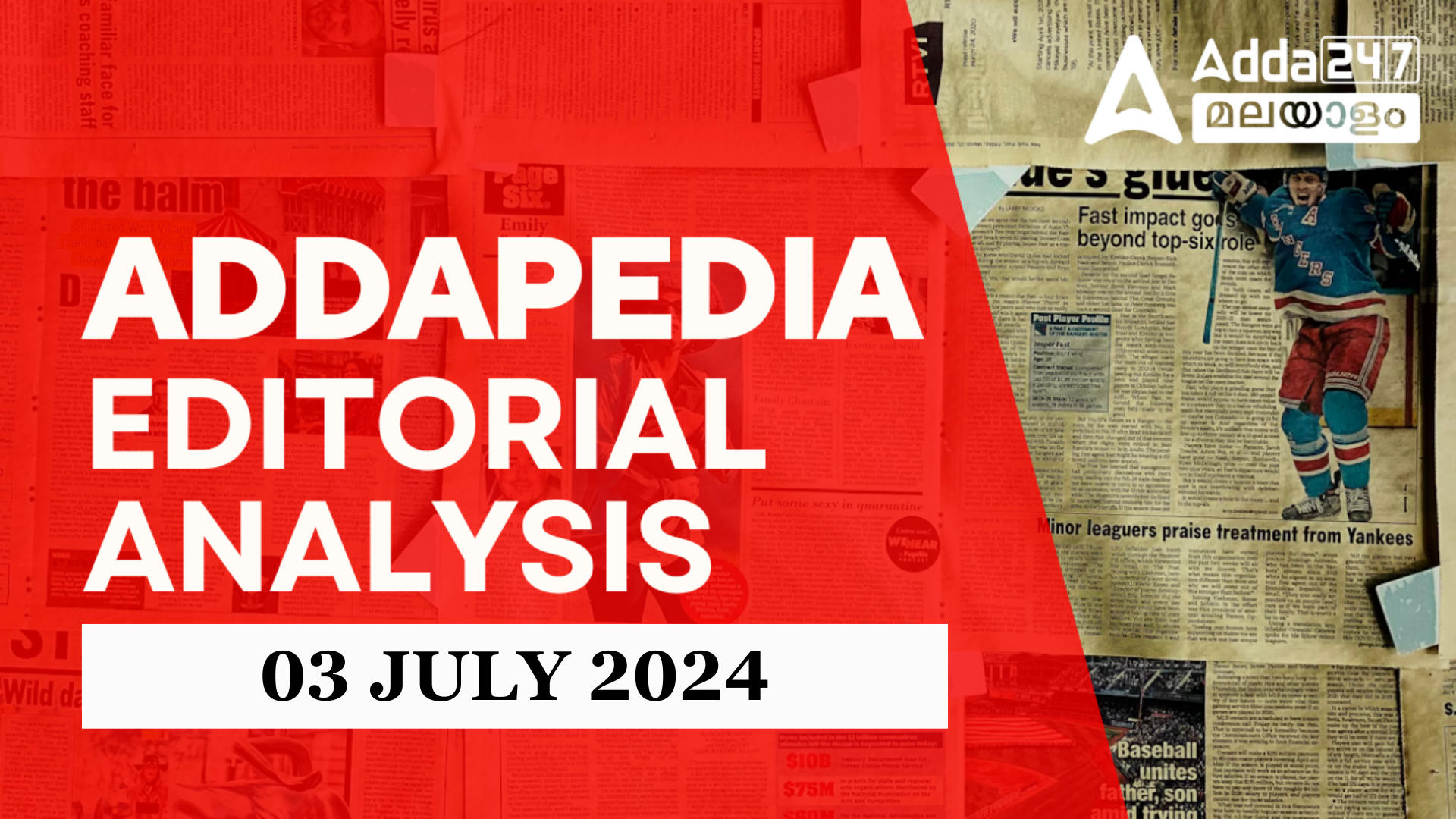Table of Contents
Addapedia Editorial Analysis: Daily News Editorial Analysis 03 July 2024
Addapedia Editorial Daily News , 03 July 2024: In this Addapedia Editorial Analysis, We cover Important News Editorials from Newspapers and provide you with detailed analysis. This ADDAPEDIA Editorial Analysis will help you in understanding the National and International events Current affairs and the background of a particular topic. This comprehensive News analysis will help you in Clearing CA and Interview for many exams.
Editorials usually cover a particular topic that might be National, State or any International event which is most important to acquire brief knowledge about the event. Editorials are written by Famous news analysts, Politicians, Business analysts, Civil Servants or a person who has immense knowledge in that particular field. Knowing Editorials will not only understand the geo-political relations but also how to write and describe any particular issue which helps especially in PSC, SSC and Banks Exams.
Digital Jurisprudence in AI Era in India
Existing legal frameworks and judicial precedents that have been designed for a pre-AI world may struggle to effectively govern AI which is a rapidly-evolving technology.
What is the main challenge in applying existing legal frameworks to Generative AI (GAI) tools?
- The existing legal frameworks were designed for a pre-AI world and struggle to categorize GAI tools. Are they intermediaries (like search engines), mere conduits for user input, or active creators of content? This ambiguity complicates assigning liability.
- There is a doubt whether the ‘safe harbor’ provision under Section 79 of the IT Act applies for GAI.
- Safe harbor protection is a legal provision that shields certain entities from liability for content or activities occurring on their platforms. This concept is particularly relevant in the context of internet intermediaries like social media platforms, search engines, and online marketplaces.
- Safe harbor protection is meant for passive intermediaries, but GAI models like Large Language Models (LLMs) blur the lines between user-generated and platform-generated content, making it difficult to determine who is responsible/liable for any harmful output
- Also, India’s Copyright Act of 1957 doesn’t explicitly address AI authorship. The Parliamentary Standing Committee has acknowledged this gap, leaving questions about whether AI-generated works should be protected and if so, who would own the copyright – the user, the programmer, or the AI itself?
- The Digital Personal Data Protection Act, 2023, grants individuals rights to erasure and to be forgotten. However, GAI models trained on vast datasets cannot easily “unlearn” personal information, raising challenges for individuals seeking to control their data.
What are the three key steps to pursue in governing Generative AI?
- Learning by Doing: A sandbox approach with temporary liability immunity can allow for responsible GAI development while identifying legal issues.
- Data Rights and Responsibilities: Overhaul data acquisition for GAI training, ensuring legal compliance and fair compensation for data owners.
- Licensing Challenges: Create centralized platforms for licensing web data to simplify access for developers and ensure data integrity
Can you answer the following question?
Critically examine the challenges posed by Generative AI (GAI) to existing legal frameworks in India, particularly with respect to the safe harbor provisions and copyright law. Discuss potential solutions to address these challenges while balancing innovation with ethical considerations.
Tajikistan’s Hijab Ban
Tajikistan’s government passed a law banning the hijab, the latest in a string of 35 wide-ranging religion-related acts, in a move described by the government as “protecting national cultural values” and “preventing superstition and extremism”
- Instead, Tajikistan citizens are encouraged to wear Tajik national dress.
What are the arguments in favor of hijab ban??
- Secularism: Some argue that public institutions like schools and colleges should be secular spaces where religious symbols and attire are not displayed.
- Women’s Empowerment: In certain contexts, there are claims that the hijab is a symbol of oppression and that banning it promotes gender equality by empowering women to make independent choices about their attire and identity.
- Social Cohesion – Proponents of the ban believe it can enhance social cohesion and integration, reducing visible differences between individuals and fostering a sense of unity.
- Security Concerns – In certain contexts, the hijab and other face-covering garments can pose security concerns by concealing identities, making it difficult to enforce safety measures
What are the arguments against hijab ban??
- Violates Freedom of Religion, Expression, and Personal Choice.
- Discriminates Against and Marginalizes Muslim Women, exacerbating social tensions and fostering an environment of exclusion.
- Distracts from Broader Issues of Gender Inequality and Women’s Empowerment.
- Targets a Specific Religious Group and Lacks Evidence for Security Claims.
- Allowing the hijab promotes cultural diversity and acceptance, enriching society by acknowledging and respecting different cultural practices.
- Banning the hijab might have the opposite effect, strengthening religious identity and resistance among Muslim communities, leading to further alienation and division.
What is the status of hijab ban in India?
- In 2024, Bombay High Court held Chembur college hijab ban was in ‘larger academic interest’.
- In 2022, Karnataka High Court stated that donning the hijab or niqab was “not an essential religious practice” for women professing Islam.
- In 2022, Supreme Court delivered a split verdict in the Karnataka hijab case.
- One of the judges held that ‘secularity’ meant ‘tolerance to diversity’. He said that asking a pre university schoolgirl to take off her hijab at her school gate is an invasion on her privacy and dignity.
- The other judge said ‘secularity’ meant ‘uniformity’ . He held that adherence to uniform was a reasonable restriction to free expression that reinforced equality.
What lies ahead?
- Encourage open and respectful dialogue between different communities to understand the significance of the hijab and the concerns of those who support a ban.
- Consider a case-by-case approach to hijab bans in specific contexts, such as educational institutions or workplaces. This allows for flexibility and takes into account the specific circumstances and needs of different communities and individuals
- Promote education and awareness about religious freedom, gender equality, and cultural sensitivity. This can help dispel stereotypes and misconceptions about the hijab and other religious practices
- Shift the focus from the hijab itself to broader issues of women’s empowerment and gender equality.
Addapedia Editorial Analysis 03 July 2024 PDF Download Link
കേരളത്തിലെ എല്ലാ മത്സര പരീക്ഷകൾക്കും ഓൺലൈൻ ക്ലാസുകൾ, വീഡിയോ കോഴ്സുകൾ, ടെസ്റ്റ് സീരീസ്, പുസ്തകങ്ങൾ, മറ്റ് പഠന സാമഗ്രികൾ എന്നിവ ചുവടെ നൽകിയിരിക്കുന്ന ലിങ്കിൽ ക്ലിക്കുചെയ്ത് കണ്ടെത്താനാകും.
***വരാനിരിക്കുന്ന പരീക്ഷകളിൽ വിജയിക്കാൻ ഞങ്ങളോടൊപ്പം ചേരുക***
*ലക്ഷ്യത്തിലേക്കുള്ള ആദ്യ ചുവടുവെപ്പ് | ADDA247 മലയാളത്തിൽ പരിശീലനം ആരംഭിക്കൂ*
Adda247 Malayalam Youtube Channel |
Telegram group:- KPSC Sure Shot Selection











